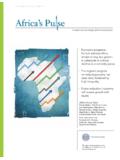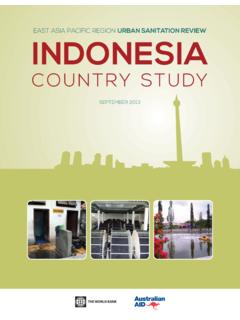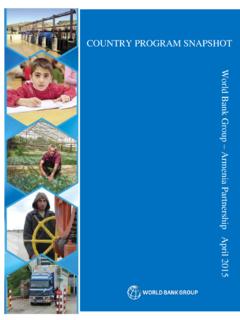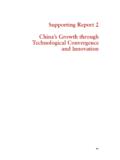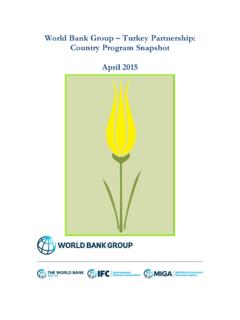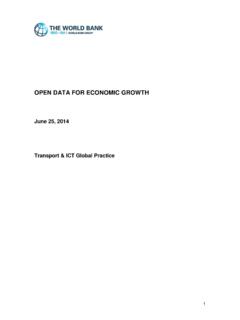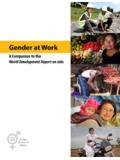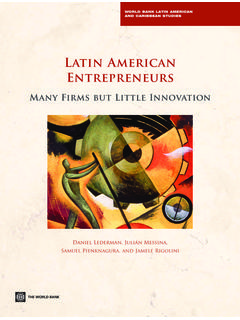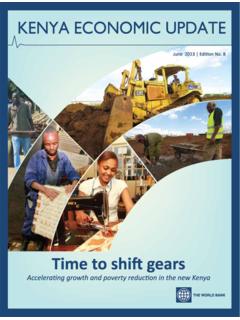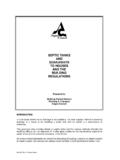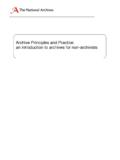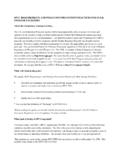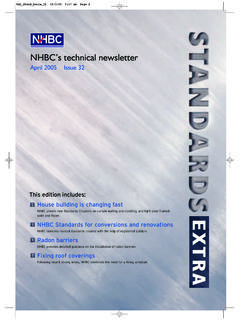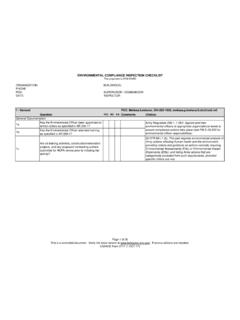Transcription of Vietnam Urban Wastewater Review - World Bank
1 Vietnam UrbanWastewater ReviewExecutive SummaryWORLD BANKV ietnam Urban Wastewater ReviewExecutive Summary 3 ACKNOWLEDGEMENTSThis Vietnam Urban Wastewater Review has been prepared by the Task Team consisting of L Duy H ng (Senior Urban Specialist, Sustainable Development Unit in Vietnam [EASVS], Team Leader), Alan Coulthart (Lead Municipal Engineer, Infrastructure Unit, East Asia and the Pacific Region [EASIN], Co-Task Team Leader from March 2012 to June 2012), Sudipto Sarkar (Sector Leader, Water and Energy, East Asia and the Pacific Region [EASWE], Co-Task Team Leader from July 2012-present), James Corning (Lead International Consultant from March 2012 to March 2013), Nguy n Vi t Anh (PhD, Associate Professor, National Wastewater Specialist), Tr n Vi t Nga (PhD, Assistant to Lead Consultant) and Ross Kearton (Technical Editor).
2 The study has produced two reports, comprising: the Executive Summary, for the decision makers, and the Technical Report for the interested specialists. The excellent guidance and support provided by Victoria Kwakwa (Country Director for Vietnam ), Jennifer Sara (Sector Manager, EASVS), Charles Feinstein (Sector Manager, EASWE), Parameswaran Iyer (Lead Water and Sanitation Specialist), Victor Vazquez Alvarez (Water and Sanitation Specialist) and other specialists from the World bank are gratefully acknowledged. In particular the Task Team would like to thank the peer reviewers Manuel Marino (Lead Water and Sanitation Specialist) and Claire Kfouri (Senior Water and Sanitation Specialist) for their valuable and constructive comments.
3 The valuable inputs of the Advisory Panel are acknowledged for the preparation and completion of the report. The Panel comprised: Assoc. Prof. Dr. Nguy n H ng Ti n (General Director, Administration of Technical Infrastructure, Ministry of Construction [MOC], Mr. Tr n Quang H ng (Vice President cum General Secretary, Vietnam Water Supply and Sewerage Association [VWSA]), Assoc. Prof. Dr. ng Qu c D ng (Vice President, VWSA), Dr. Ph m Ng c Th i (Former Manager, Science and Technology Department, VWSA), Dr. Ph m S Li m (Former Vice Minister, MOC), Dr. D ng c ng (Former General Director, Foreign Economic Relations Department, Ministry of Planning and Investment [MPI]) and Mrs.)
4 Nguy n H ng Y n (Former Deputy General Director, External Finance Department, Ministry of Finance [MOF]). The study team would like to thank all the officials from the Vietnamese ministries Ministry of Construction (MOC), Ministry of Planning and Investment (MPI), Ministry of Finance (MOF), and the Ministry of Natural Resources and Environment (MONRE), city/provincial authorities, owners, operators and other agencies of the Wastewater facilities as well all the colleagues from the relevant donors (Asian Development bank [ADB], Japan International Cooperation Agency [JICA], and Kreditstalt f r Wiederaufbau [KfW]) for their valuable help and cooperation provided so far.
5 The Vietnam Wastewater Review in Urban Areas was generously financed by the Australian views expressed in this publication are those of the authors and not necessarily those of the Australian study is a product of the staff of the World bank . The findings, interpretation and conclusions expressed herein do not necessarily reflect the view of the Board of Executive Directors of the World bank or the governments they represent4 TABLE OF CONTENTS Abbreviations5 Introduction61. Wastewater Sector Performance in Vietnam6 Main Findings on Sector Performance 6 Sector Performance Analysis72. Key Messages and Recommendations9 Messages for the consideration of National Policy Makers9 Messages for the consideration of Local Government and Local Sanitation Service Providers105 ABBREVIATIONS ADB Asian Development BankCAPEX Capital Expenditure/Capital ExpenseCSO Combined Sewer Overflow (Diversion chamber)CSS Combined sewerage systemEAUSFS East Asia Sanitation Flagship StudyEP Environmental ProtectionFSM Fecal sludge (septage)
6 ManagementHHs/HHC Households/Household connectionIEC Information, Education and CommunicationIWRM Integrated Water Resource ManagementMLD Million liters per dayMOC Ministry of ConstructionM&E Monitoring and Evaluation ODA Official Development AssistanceO&M Operation and MaintenanceOPEX Operating Expenditure/ Operating ExpensePPP Public-Private-PartnershipPSP Private Sector ParticipationQCVN Vietnam (National) Technical RegulationRBA River basin approachSSS Separate sewerage systemTCVN Vietnam National StandardsU3 SAP Sanitation Sector Strategy and Action PlanUSD United States DollarVND Vietnamese DongWB The World BankWWTP Wastewater Treatment Plant 6vietnam Urban Wastewater Review Introduction1.
7 Vietnam is facing the challenge of trying to keep pace with increasing environmental pollution associated with rapid urbanization, especially in the larger cities. Over the past 20 years, the Government of Vietnam has made considerable effort to develop Urban sanitation policies, legislations and regulations and to invest in Urban sanitation including Wastewater treatment This study is one of three country studies conducted in the emerging countries of Vietnam , the Philippines and Indonesia as part of the East Asian Urban Sanitation Review . It reviews the effectiveness of the Wastewater sector in Vietnam and makes recommendations to the Government on actions to scale up the sector to improve its performance.
8 Lessons that emerge from this study can be considered for the on-going and/or the next generation of Wastewater Wastewater Sector Performance in VietnamMain Findings on Sector Performance 3. Since 1998, the Government of Vietnam has initiated policies and provided investment to improve Urban sanitation resulting in significant progress in development of the Wastewater sector. Achievements are as follows: Provision of Wastewater services to the Urban poor has been impressive with open defecation now eliminated. Access to toilets is now 94 percent1, with 90 percent of households using septic tanks as a means of on-site 60 percent of households dispose of Wastewater to a public sewerage system, primarily comprising combined By 2012 some 17 Urban Wastewater systems had been constructed in Hanoi, Ho Chi Minh City and Da Nang and another five systems in provincial towns and cities with a total capacity of 530,000 cubic meters per day (m3/day).
9 Currently some 30 new Wastewater systems, primarily comprising combined systems, are in the design/construction phase. During the past decade annual sanitation sector investment has been USD 150 million or USD billion for drainage and Wastewater during the period 1995-2009. This represents percent of GDP Despite these impressive initiatives, Urban sanitation continues to face critical issues that need to be urgently addressed: Although 60 percent of households dispose of Wastewater to a public system, much of this is directed informally to the drainage system and only 10 percent is treated. While 90 percent of households dispose of Wastewater to septic tanks, only 4 percent of septage is treated.
10 Fecal sludge management is generally poor in most JMP, WHO United Nations Children s Fund (UNICEF), Nguyen V. A., Nguyen V. A., Grontmij Water and Sanitation Program (WSP), executive summary The focus of Wastewater expenditure to date has been in constructing treatment facilities, but this has not always been accompanied by appropriate collection systems. Despite Wastewater tariffs in the order of 10 percent of water tariffs being charged, cost recovery of the capital and operations and maintenance (O&M) costs of the Wastewater systems is generally low. Institutional arrangements do not encourage efficient system operation with the Wastewater enterprises having limited autonomy to manage operations and undertake system development.

